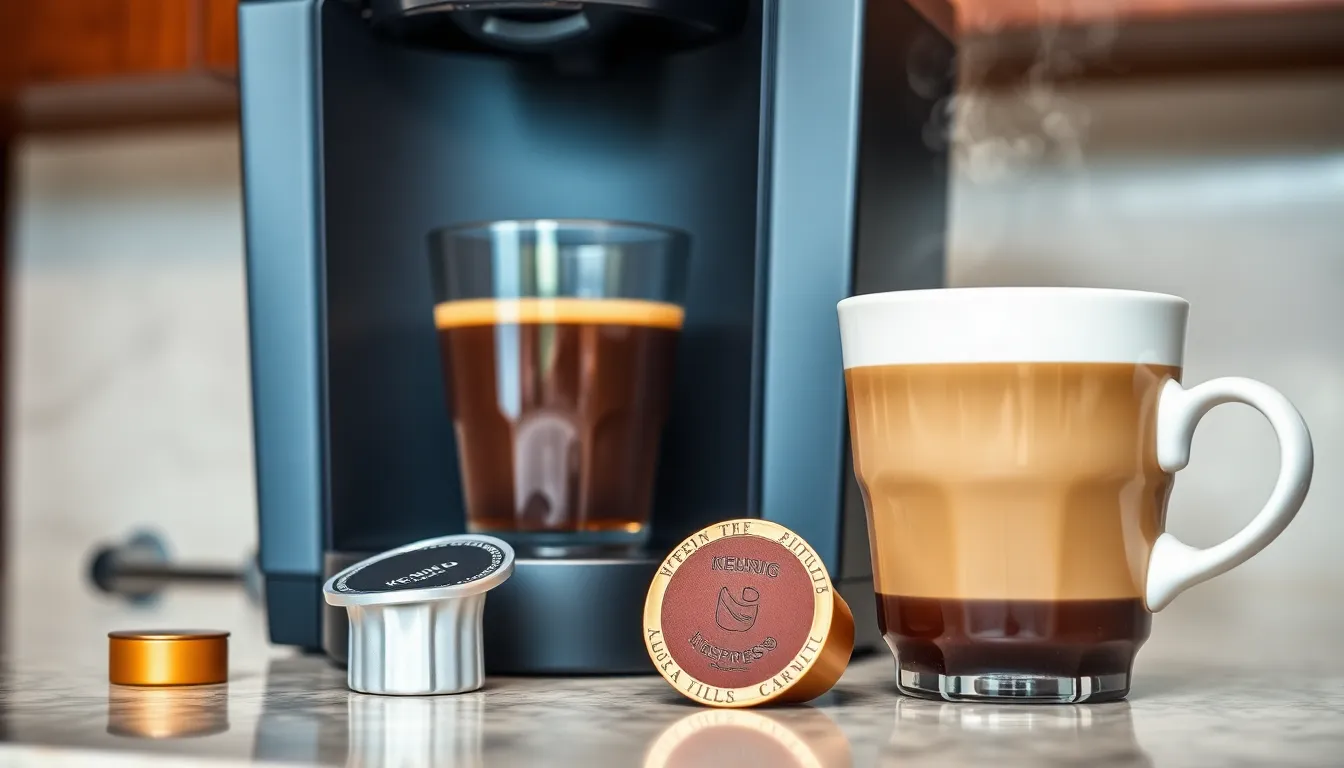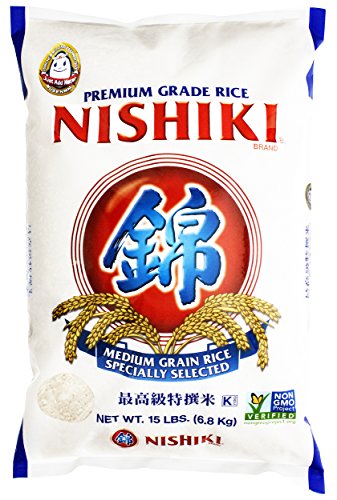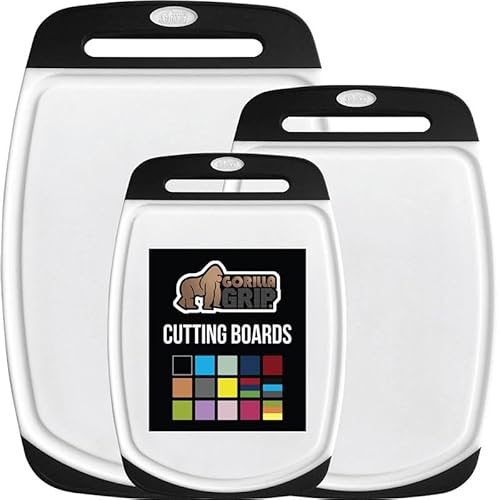Wondering how much caffeine is in a coffee pod that powers your morning routine? That small capsule packs more of a punch than you might think, and understanding its caffeine content could be key to managing your daily intake.
Coffee pods typically contain between 60-140mg of caffeine, but this can vary significantly depending on the brand, roast type, and serving size. Whether you’re using Keurig K-Cups, Nespresso capsules, or other popular pod varieties, each delivers a different caffeine concentration that affects your energy levels and sleep patterns. If you’re tracking your caffeine consumption for health reasons or simply curious about what’s fueling your day, knowing these numbers matters.
Understanding Caffeine Content in Coffee Pods
Coffee pods contain varying amounts of caffeine depending on several key factors. The typical range falls between 60-140mg per serving, but this can fluctuate based on exact variables that affect the final caffeine concentration.
Factors Affecting Caffeine Levels
Multiple elements influence how much caffeine ends up in your coffee pod. Bean variety plays a crucial role – Arabica beans contain approximately 1.2-1.5% caffeine by weight, while Robusta beans pack nearly double that amount at 2.2-2.7%. Roast level also impacts caffeine content; contrary to popular belief, lighter roasts often contain more caffeine than darker roasts because the roasting process breaks down some caffeine molecules. Pod size matters significantly, with standard K-Cups holding about 9-12g of coffee while Nespresso capsules typically contain 5-7g. Brewing parameters such as water temperature and pressure in your pod machine can extract different amounts of caffeine from identical pods.
Popular Coffee Pod Brands and Their Caffeine Content
Different brands offer varying caffeine levels in their coffee pod products. Keurig K-Cups average between 75-125mg per 8oz serving, with their Dark Roast pods containing approximately 75-85mg and their Light Roast varieties delivering 90-100mg. Nespresso Original Line capsules provide 55-65mg in a typical 1.35oz espresso shot, while their Vertuo Line pods can contain up to 170mg in larger coffee servings. Lavazza pods typically contain 60-80mg of caffeine per serving. Store brands and generic pods generally fall within the 60-100mg range but lack consistent standardization across products.
How to Find Caffeine Information for Your Coffee Pods
Locating precise caffeine information for your preferred coffee pods involves checking multiple sources. Product packaging sometimes lists caffeine content, though this information isn’t consistently provided by all manufacturers. Brand websites frequently offer more detailed nutritional information than what fits on packaging – check the product specifications or FAQ sections. Direct contact with manufacturers through customer service channels can yield precise caffeine measurements when publicly available information is limited. Third-party testing databases like Consumer Reports or independent coffee review sites occasionally publish comparative caffeine analyses of popular pod brands.
Average Caffeine Levels in Popular Coffee Pod Brands
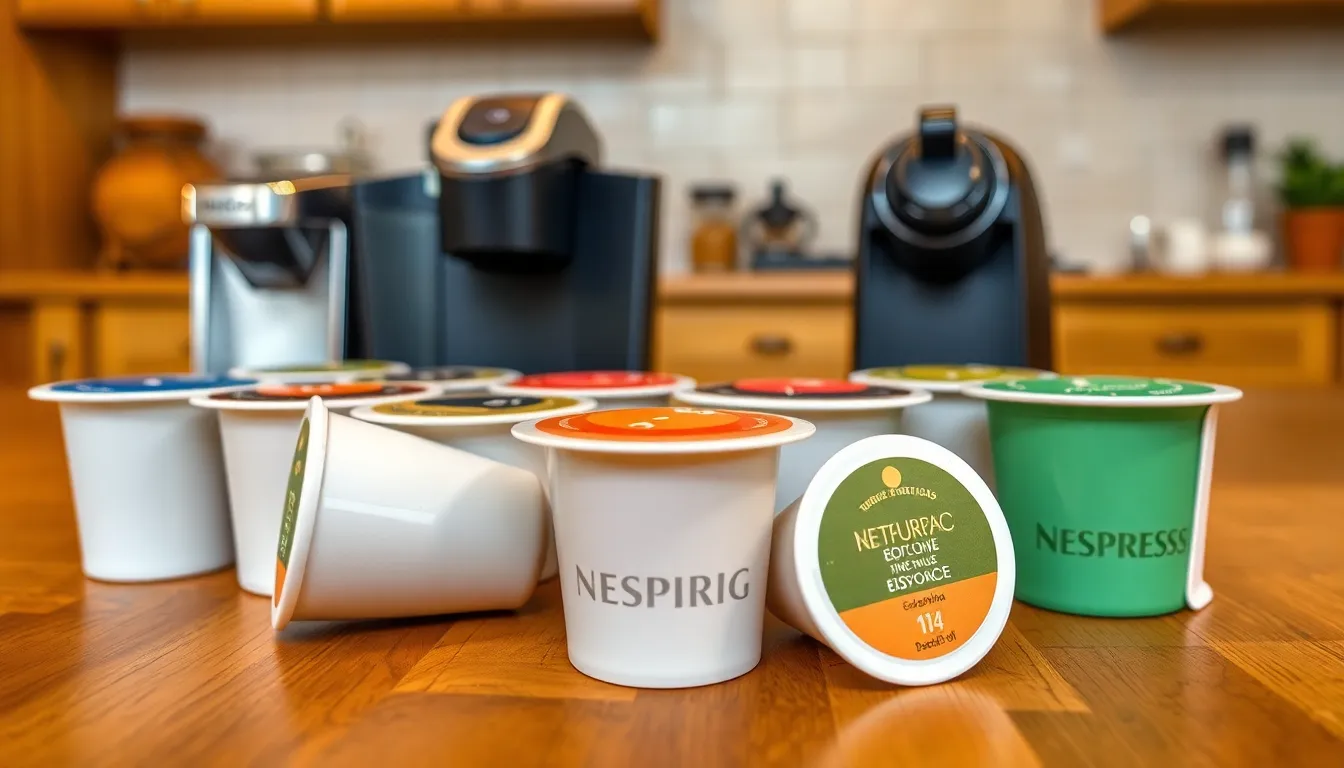
Coffee pods contain varying levels of caffeine depending on the brand, blend, and brewing method. Understanding these differences helps you make informed choices about your daily caffeine consumption.
Keurig K-Cups
Keurig K-Cups deliver approximately 100 mg of caffeine per 8-ounce cup of brewed coffee. This translates to about 12.5 mg of caffeine per fluid ounce or 42 mg per 100 ml. Most standard K-Cup varieties maintain this caffeine level consistently across different flavors, though specialty blends may contain slightly different amounts. Regular K-Cup users appreciate this predictable caffeine content, making it easier to track daily intake without surprises.
Nespresso Capsules
Nespresso capsules feature different caffeine levels based on their product line and intended brewing method. OriginalLine espresso pods typically contain around 60 mg of caffeine in each 1.35 oz (40 ml) shot. Stronger varieties like the Palermo Kazaar can pack up to 125 mg per pod due to their higher Robusta bean content. Lungo-style capsules, designed for larger cup sizes with longer extraction times, generally provide 80-90 mg of caffeine per serving. Coffee enthusiasts often praise Nespresso’s range of intensity options that allow for customized caffeine experiences throughout the day.
Store Brand Coffee Pods
Store brand coffee pods vary significantly in caffeine content based on manufacturer specifications and coffee blends. Standard store brand options typically contain 100-130 mg of caffeine per 8 oz cup, comparable to name-brand K-Cups. Extra-strength or “plus” variants can contain substantially more caffeine—up to 260 mg per pod—often achieved through higher coffee concentration or Robusta-heavy blends. Compact brewer pods generally provide between 40-60 mg of caffeine per serving. Checking exact product packaging remains the most reliable way to determine exact caffeine content for any store brand pod. Budget-conscious consumers frequently report satisfaction with store brand options that deliver similar caffeine levels to premium brands at lower price points.
Factors That Affect Caffeine Content in Coffee Pods
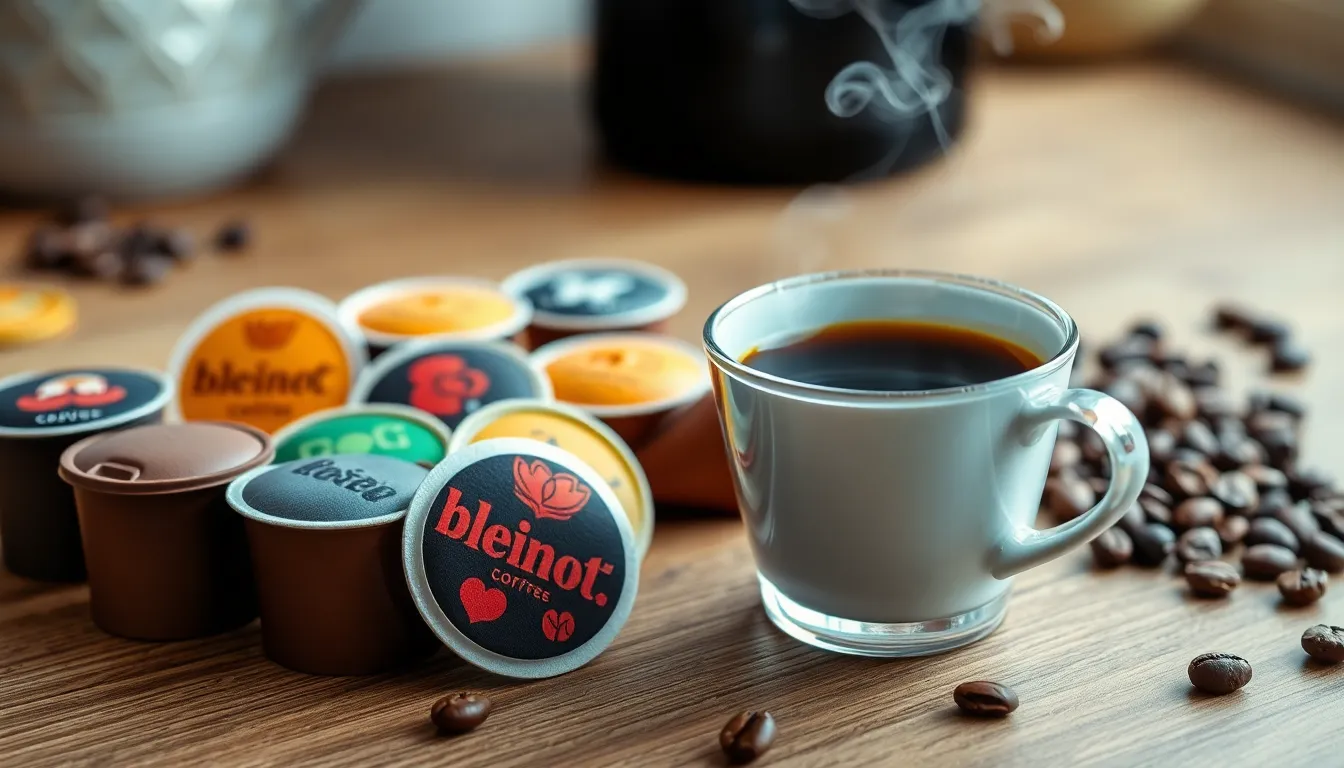
Coffee pod caffeine content varies significantly based on several key factors. Understanding these variables helps you make informed choices about your daily caffeine consumption. Let’s examine the primary elements that influence how much caffeine ends up in your cup.
Coffee Bean Type
Coffee bean variety dramatically impacts the caffeine content in your pods. Arabica beans contain approximately 1.2-1.5% caffeine by weight, making them the milder option commonly found in premium coffee pods. Robusta beans, in contrast, pack nearly double the caffeine at 2.2-2.7%, creating a stronger, more caffeinated brew. Many manufacturers blend these bean types to achieve exact flavor and caffeine profiles. High-caffeine specialty pods often incorporate more Robusta beans to deliver that extra energy boost, with some products like Death Wish Coffee exceeding 250 mg of caffeine per serving.
Roast Level
The roasting process significantly affects caffeine concentration in coffee pods. Light roasts typically contain slightly more caffeine per gram than dark roasts because less caffeine burns off during the shorter roasting time. Dark roasts, but, experience more volume loss through moisture evaporation, resulting in beans with higher oil content and lower density. This means that when measuring coffee by volume (as pods do), light roasts and dark roasts often have comparable caffeine levels, though light roasts might edge ahead slightly. The common misconception that darker roasts always pack more caffeine stems from their bolder, more intense flavor profile rather than actual caffeine content.
Brewing Method
Brewing parameters substantially influence caffeine extraction from coffee pods. Water temperature, contact time, and pressure all determine how efficiently caffeine transfers from the ground coffee into your cup. Espresso-style pods use less water but higher pressure, creating a concentrated serving with about 50-65 mg of caffeine per capsule. Standard K-Cup pods typically deliver between 75-150 mg of caffeine per 8 oz cup using moderate pressure and more water. Some “plus” or extra-strength pods can contain up to 260 mg per serving by optimizing these brewing factors for maximum caffeine extraction. Pod size also matters—larger pods that hold more coffee grounds naturally yield more caffeine, assuming all other variables remain constant.
Comparing Coffee Pod Caffeine to Other Coffee Drinks
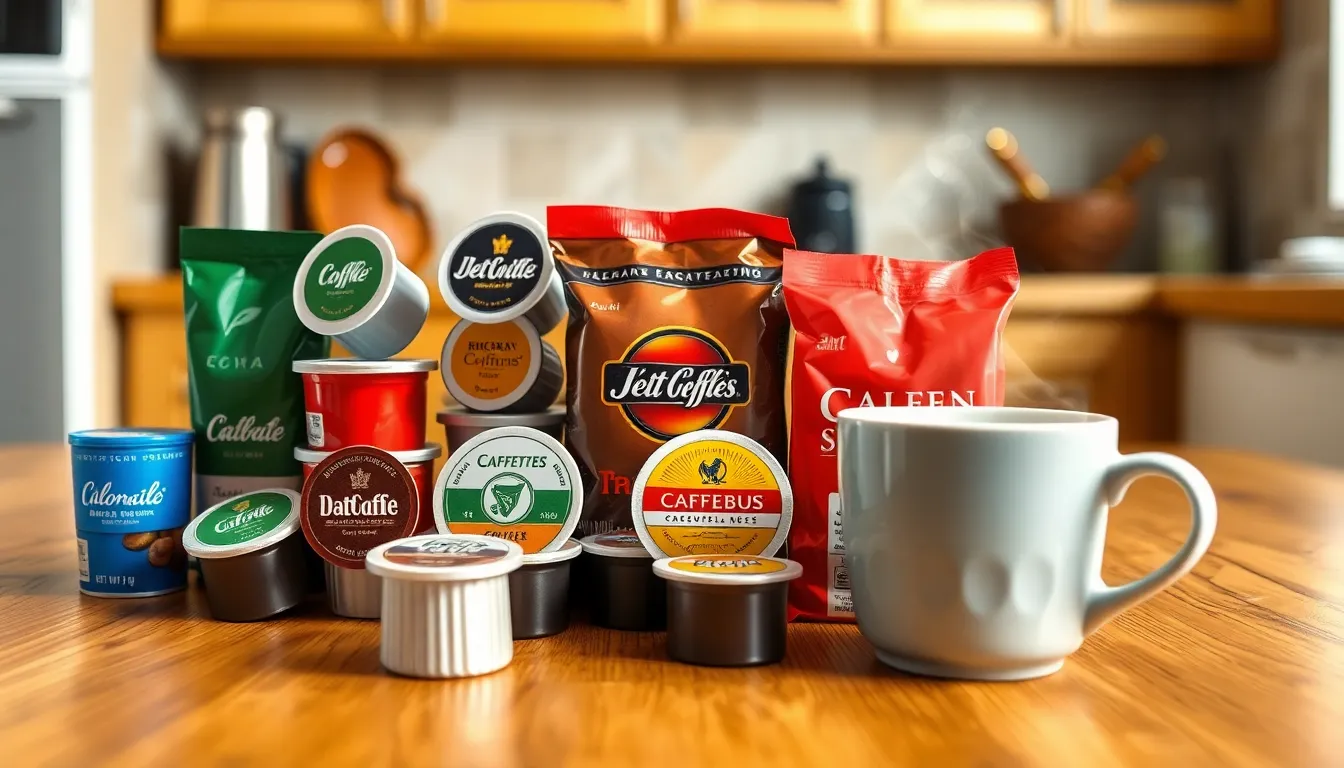
Coffee pods offer caffeine levels comparable to many traditional coffee beverages, with distinctive differences worth noting. A standard 8 oz cup from a coffee pod typically contains 75-150 mg of caffeine, placing it squarely within the range of regular brewed coffee (95-165 mg per 8 oz). Espresso-style pods like Nespresso Original Line deliver approximately 60 mg per 1.35 oz shot, matching the caffeine content of traditionally prepared espresso shots (60-75 mg).
Different pod formats create varying caffeine experiences across the spectrum. Small-sized coffee pods provide a gentler caffeine dose at 40-45 mg per 12 oz serving. Standard coffee pods deliver about 130 mg per 8 oz cup, closely aligning with medium-strength drip coffee. Plus-sized or extra-strength pods pack a important punch with up to 260 mg of caffeine per 8 oz serving, exceeding even strong traditionally brewed coffee.
Specialty pod varieties like Death Wish Coffee K-Cups contain approximately 295 mg of caffeine per serving, surpassing most conventional coffee drinks available at cafes. Popular brand options demonstrate this range effectively—Starbucks Pike Place pods contain 130 mg, Dunkin’ Donuts Original Blend pods offer 120 mg, and Green Mountain Breakfast Blend pods provide a milder 75 mg per serving.
Nespresso’s diverse lineup shows similar variation, with standard espresso pods containing 60 mg while specialty options like Palermo Kazaar reach 125 mg even though the smaller serving size. Lungo pods from Nespresso typically contain more caffeine than their espresso counterparts due to the extended extraction time, creating a different caffeine profile even within the same pod system.
| Coffee Type | Serving Size | Typical Caffeine Content |
|---|---|---|
| Coffee Pod (Standard) | 8 oz | 75-150 mg |
| Traditional Brewed Coffee | 8 oz | 95-165 mg |
| Espresso Shot | 1-1.5 oz | 60-75 mg |
| Nespresso Original Pod | 1.35 oz | ~60 mg |
| Smaller Coffee Pods | 12 oz | 40-45 mg |
| Plus-Sized Coffee Pods | 8 oz | Up to 260 mg |
| Death Wish Coffee Pod | 8 oz | 295 mg |
Brand-exact variations create meaningful differences in your caffeine experience. McCafé Premium Roast pods deliver a moderate 100 mg per cup, while standard store brand pods typically contain 100-130 mg per serving. This range demonstrates that coffee pods offer caffeine options suitable for various preferences, from those seeking a gentle morning boost to those requiring maximum caffeine impact.
Health Considerations for Coffee Pod Caffeine Consumption
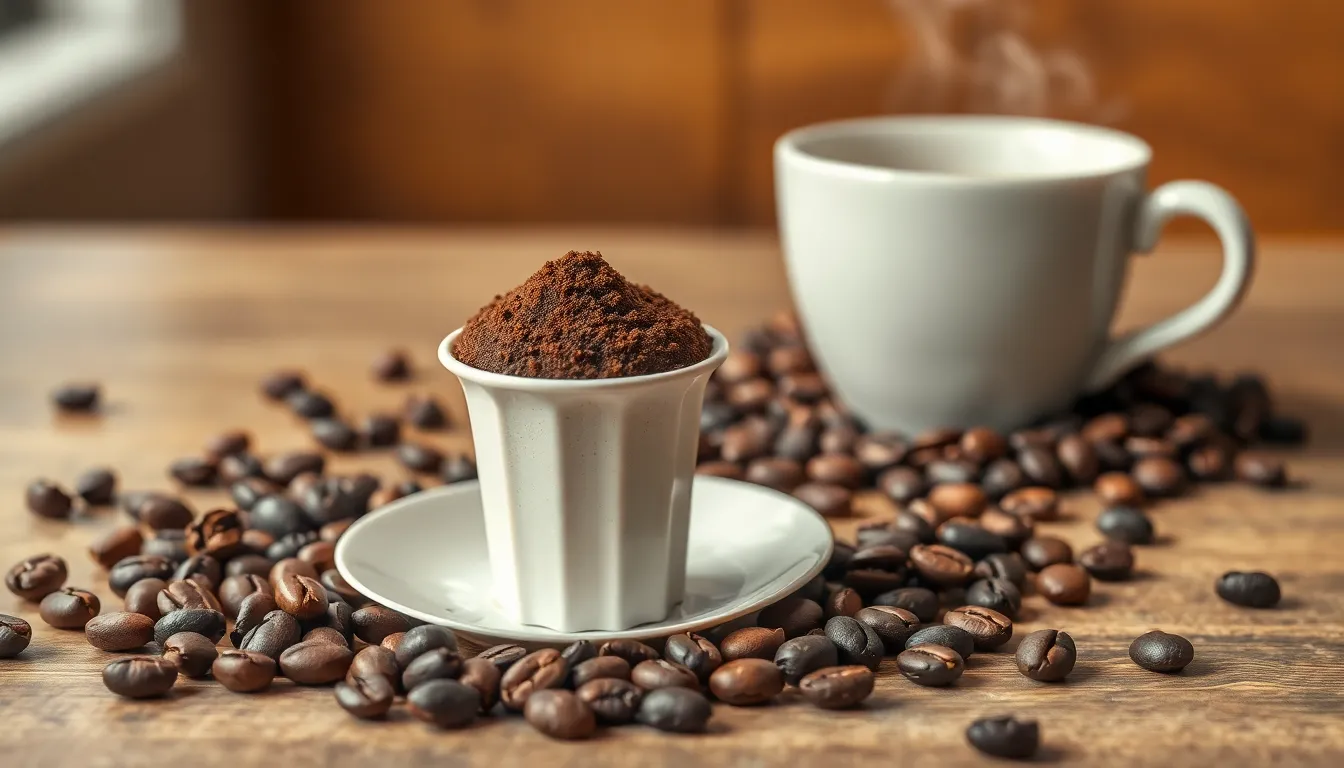
Understanding your daily caffeine intake from coffee pods helps you make informed decisions about consumption patterns. Major health authorities recommend limiting caffeine to 400 mg daily for healthy adults. Your morning ritual of brewing multiple high-caffeine pods can quickly approach or exceed this threshold, potentially triggering unwanted side effects.
Excessive caffeine consumption manifests through several physical symptoms including:
- Restlessness and anxiety – feeling jittery or on edge after too many pods
- Sleep disruption – difficulty falling asleep even when consuming pods earlier in the day
- Increased heart rate – noticeable palpitations or racing heartbeat
- Digestive issues – stomach discomfort or acid reflux following consumption
Tracking your pod consumption becomes particularly important when using higher-caffeine varieties. A single Starbucks Pike Place K-Cup contains 130 mg of caffeine, meaning just three pods throughout the day puts you near the recommended limit. Green Mountain Breakfast Blend offers a lower alternative at 75 mg per serving for those seeking moderation.
Individual caffeine sensitivity varies significantly based on factors like body weight, medication use, and underlying health conditions. Your personal tolerance depends on these variables along with your consumption history—regular coffee drinkers typically develop higher tolerance levels over time.
Morning coffee pods impact your body differently than afternoon or evening servings due to caffeine’s 5-6 hour half-life. Consuming a 120 mg Dunkin’ Donuts Original Blend K-Cup at 3 PM means approximately 60 mg remains in your system at 9 PM, potentially affecting sleep quality.
Monitoring total daily caffeine intake from all sources—not just coffee pods—provides the most accurate picture of consumption. Energy drinks, chocolate, tea, and certain medications also contribute to your overall caffeine load and should factor into your daily calculations.
How to Find Low-Caffeine Coffee Pod Options
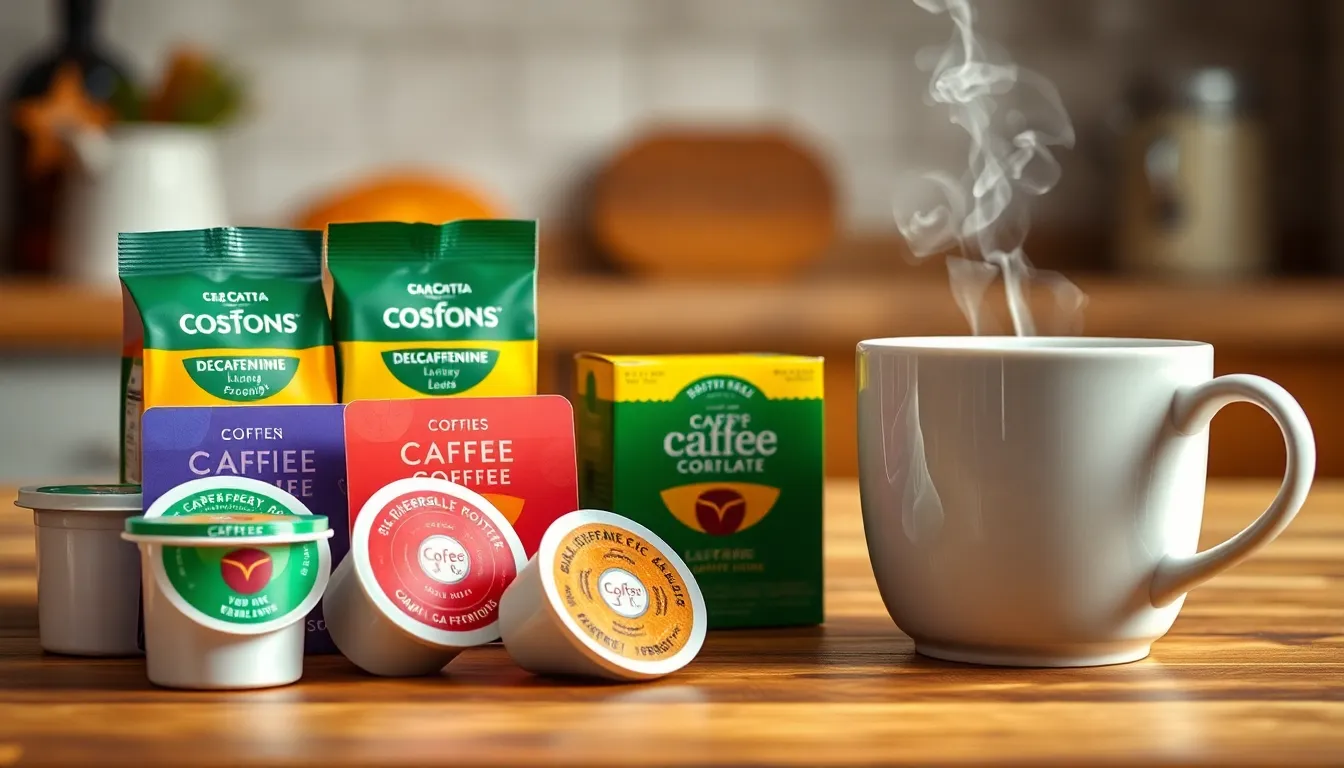
Finding coffee pods with lower caffeine content is straightforward when you know what to look for. Coffee pods labeled specifically as “decaffeinated” or “low caffeine” offer the most obvious solution for reducing your caffeine intake while still enjoying your morning ritual.
Pod size significantly impacts caffeine content, with smaller pods typically containing just 40-45 mg of caffeine compared to standard pods’ 90-130 mg. Selecting these smaller options automatically reduces your caffeine consumption without sacrificing flavor.
Roast level provides another indicator of potential caffeine content. Light roasts, contrary to popular belief, often contain slightly more caffeine than dark roasts, though the difference is minimal. Medium roasts typically offer a balanced caffeine profile that satisfies without overwhelming.
Brand selection matters considerably when seeking lower-caffeine options. Many manufacturers now provide detailed caffeine information online or directly on packaging. Nespresso OriginalLine pods, for example, generally contain around 60 mg of caffeine per pod, making them a moderate option compared to some K-Cups that reach 150 mg or higher.
Checking manufacturer websites yields the most accurate information about exact caffeine levels. Most major coffee pod companies maintain detailed product pages listing caffeine content alongside other nutritional information.
Specialty varieties labeled as “evening blend” or “gentle” often indicate lower caffeine formulations designed for later-day consumption without disrupting sleep patterns. These thoughtfully crafted options provide a perfect solution for afternoon coffee cravings.
Conclusion
Understanding the caffeine content in your coffee pods empowers you to make informed choices about your daily intake. With levels ranging from 60-140mg per serving across popular brands like Keurig K-Cups and Nespresso capsules you can better manage your energy levels throughout the day.
Remember that factors like bean variety roast level and brewing parameters all affect the final caffeine concentration. For those monitoring consumption both low-caffeine and decaf options are readily available.
Always check product packaging or manufacturer websites for the most accurate information about your preferred pods. By being mindful of your caffeine intake you’ll enjoy your coffee experience while maintaining the perfect balance for your personal health needs.
Frequently Asked Questions
How much caffeine is in a typical coffee pod?
Most coffee pods contain between 60-140mg of caffeine per serving. Keurig K-Cups typically have 75-125mg per 8oz cup, while Nespresso Original Line capsules provide 55-65mg in an espresso shot. The exact amount varies based on brand, roast type, bean variety, and pod size.
Do light or dark roast coffee pods have more caffeine?
Contrary to popular belief, light roast coffee pods generally contain slightly more caffeine than dark roasts. This occurs because dark roasting burns off a small amount of caffeine. However, the difference is minimal, and other factors like bean type and brewing method have a greater impact on overall caffeine content.
Which has more caffeine: Arabica or Robusta coffee pods?
Robusta beans contain nearly twice the caffeine of Arabica beans. Robusta beans have approximately 2.2-2.7% caffeine content, while Arabica beans contain about 1.2-1.5%. Coffee pods made exclusively with Robusta beans will typically deliver a significantly stronger caffeine kick than those made with Arabica.
How does Nespresso Vertuo caffeine content compare to Original Line?
Nespresso Vertuo Line pods generally contain more caffeine than Original Line capsules. While Original Line espresso capsules provide about 55-65mg of caffeine, Vertuo pods can contain up to 170mg depending on the cup size. This difference is due to Vertuo’s larger serving sizes and different brewing technology.
What’s the maximum safe amount of caffeine from coffee pods daily?
Healthy adults should limit caffeine intake to 400mg daily, according to health authorities. This equals about 3-4 regular coffee pods. Individual tolerance varies based on weight, metabolism, and health conditions. Those with certain medical conditions, pregnant women, and those sensitive to caffeine should consume less.
Do store brand coffee pods contain less caffeine than premium brands?
Store brand coffee pods typically contain similar caffeine levels to premium brands, ranging from 100-130mg per 8oz cup. The caffeine content depends more on the coffee beans and roast type than on brand prestige. Some store brands even offer extra-strength options with up to 260mg of caffeine.
How can I find the exact caffeine content of my coffee pods?
Check the product packaging for caffeine information first. If unavailable, visit the manufacturer’s website or contact their customer service directly. Third-party testing databases and apps that track caffeine content can also provide useful comparisons. Remember that exact amounts may vary slightly between production batches.
Are there low-caffeine coffee pod options available?
Yes, many low-caffeine coffee pod options exist. Look for pods labeled “decaffeinated” (which still contain 2-5mg of caffeine) or specifically marked as low-caffeine. Smaller-sized pods naturally contain less caffeine (40-45mg). Some brands offer “evening blend” or “gentle” varieties specifically designed for reduced caffeine consumption.
How does caffeine in coffee pods compare to regular brewed coffee?
Standard 8oz coffee pods contain 75-150mg of caffeine, comparable to regular brewed coffee (95-165mg). Espresso-style pods match traditional espresso shots in caffeine content. The main difference is consistency—coffee pods deliver more uniform caffeine levels each time compared to manually brewed coffee, which can vary significantly.
What factors affect how much caffeine I get from a coffee pod?
Key factors include bean type (Arabica vs. Robusta), roast level (light vs. dark), pod size, and brewing parameters. Water temperature and pressure significantly impact extraction—hotter water and higher pressure extract more caffeine. Your brewing machine settings and whether you use the recommended serving size also influence the final caffeine content.

